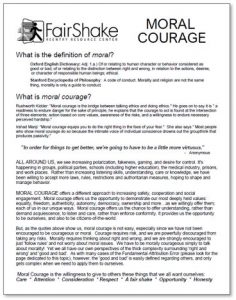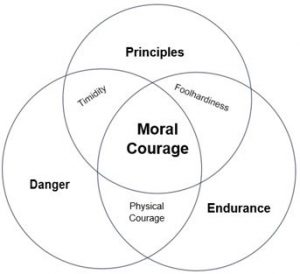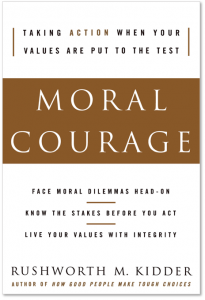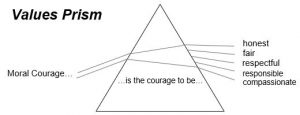You can easily judge the character of a man by how he treats those who can do nothing for him.
- Johann Wolfgang von Goethe |
Moral Courage
“Courage is the only virtue you can’t fake.” – Nassim Taleb 
Moral courage is necessary when we are required to declare our boundaries, protect our values and care for humanity. It is often required when we defend ourselves or someone else; such as protecting a child, pushing back on bullies or confronting someone who has hurt us or lied.
Sometimes moral courage is required to be honest with ourselves.
In our current climate of political polarization, we often need moral courage to simply ask “why?”
To muster moral courage, can we tap into the power we feel about things that we love, care for, or defend? We could build this skill by starting with a list of things we would, absolutely, take a stand about – even in a crowded room of people. We can ask: Would I protect babies? Elders? My best friend? Animals? My car / home / stuff? Myself?
“There is a price to pay for speaking the truth. There is a bigger price for living a lie.” – Cornel West
PRICE: When we take a stand, we might stand alone. Sometimes people are afraid to hang out with a morally courageous person. You’ll have to ask yourself: “Am I okay with this? What can I do to bolster myself?” Being alone may feel very challenging, but being alone can open up space to learn more, reflect deeply and engage with new people!
OBSERVATION: Although we are encouraged to live authentically, a fair amount of people want us to agree with them; to do what they want us to do, to buy they stuff that they like, and to agree with their perspective on just about everything. We are encouraged to view choice as an option between ‘purple or green’, but not to include ‘no’, ‘neither of those’, ‘not today’, or ‘I have another idea’….
“If I can’t say no, my ‘yes’ has no meaning.” – Peter Block
Questions that may bolster our moral courage:
– Motives: What do I love so much that I want to protect it? Why do I feel like I need to take a stand?
– Inhibitions: What might stop me from protecting what I love? What are some deep fears I have about taking a stand of any kind? What if my motivation is based on my feelings and not ‘research’?
– Risk challenges (real or perceived): some of the social, emotional and even occupational risks can include: disapproval by family, friends, people in positions of authority; lack of support, shocking conventional opinion, shame, humiliation, ostracism, loss of status, loss of job and more.
“If you are neutral in situations of injustice, you have chosen the side of the oppressor. If an elephant has its foot on the tail of a mouse and you say that you are neutral, the mouse will not appreciate your neutrality.” – Archbishop Desmond Tutu
by Rushworth Kidder
Kidder defines moral courage as “a commitment to moral principles, an awareness of the danger involved in supporting those principles, and a willing endurance of that danger.”
“Sound values raise tough choices.” – Rushworth M. Kidder
According to Kidder, three components must be present for moral courage to occur:
 1. Principles: Convictions, core values, foundation for beliefs
1. Principles: Convictions, core values, foundation for beliefs
2. Danger: Possibility of suffering physical or emotional harm or injury
3. Endurance: Fortitude; ability to last
If only two of the elements are present, the result will be:
Danger + Principles = Timidity: Lack of self-confidence, boldness, or determination
Principles + Endurance = Foolhardiness: Rashness, incautious, recklessness
Endurance + Danger = Physical Courage: Bravery in the face of pain, hardship, even death
“The really tough choices…don’t center upon right versus wrong. They involve right versus right. They are genuine dilemmas precisely because each side is firmly rooted in basic, core values..” – Rushworth Kidder
Nel Noddings | American philosopher
https://www.britannica.com/biography/Nel-Noddings
American philosopher Nel Noddings provided one of the first comprehensive theories of care and argued that caring is the foundation of morality. She saw relationships as ontologically basic to humanity (a basic aspect of being human), where identity is defined by the set of relationships individuals have with other humans.
* as found on the Encyclopedia Britannica website
This basic foundation of care links us, as much of ‘being human’ does, to the philosophy of UBUNTU: .fairshake.net/ubuntu-building-social-fabric.
Find out more about morals and morality on other Fair Shake pages:
– Belief
.
“Courage is the only virtue you can’t fake.”
– Nassim Nicholas Taleb
“You can choose courage, or you can choose comfort, but you cannot choose both.”
– Brene Brown
“If you want peace, you don’t talk to your friends. You talk to your enemies.”
– Archbishop Desmond Tutu
“Keep in mind, when two enemies are talking, they’re not fighting, they’re talking. They might be yelling and screaming, but at least they’re talking. It’s when the talking ceases that the ground becomes fertile for violence.”
– Daryl Davis
“Courage is what it takes to stand up and speak; courage is also what it takes to sit down and listen.”
– T.S. Eliot
“Love without courage and wisdom is sentimentality, as with the ordinary church member.
Courage without love and wisdom is foolhardiness, as with the ordinary soldier.
Wisdom without love and courage is cowardice, as with the ordinary intellectual.
Therefore one who has love, courage and wisdom is one in a million who moves the world, as with Jesus, Buddha and Gandhi.”
– Ammon Hennacy




